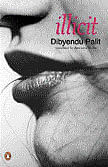Thought-provoking intimacies

Illicit
Dibyendu Palit, Translated by Arunava Sinha
Penguin, 2010,
pp 122, Rs 150
The cover photo is of a woman’s face, so close up that only her lips and part of her nose are visible. There are a few stray hairs. Just like the photo, Illicit is a book that’s excruciatingly focused on a single person, ignoring everything she doesn’t care about herself.
Jeena is a housewife in Kolkata, living a ‘normal’, boring, life with Ashim, her husband. As the book opens, Jeena is thinking of Partha, a married man who lives in the same building. The two have fallen in love — or is it lust? — with each other, and are now preparing for a short, clandestine, trip to nearby Puri. It is clear that Jeena doesn’t think of Ashim as a bad person in any way, nor does she think that Partha is a great guy. Her physical attraction for Partha is her reason for this affair, or so she tells herself.
The story follows her through her three-day journey to Puri. It feels like a lot longer, though, because we’re following every thought and idle musing that Jeena has through this period. The scrutiny begins right from the first scene, when she sits down with a cup of tea. She thinks about how she met Partha, then about how the trees look through her window, then about the TV serial going on in front of her…
Having this intimate view into a person’s mind allows us to understand how even seemingly trivial events affect one’s thinking, and how decisions that seem random and illogical have actually been building for a long time. When Jeena is unwillingly pulled into a conversation with a newly-married couple, half-buried thoughts and feelings come back to the surface, and we see how they change her feelings about Partha and Ashim.
As the trip progresses, even though no large accidents or problems happen, Jeena’s state of mind tells us that things are not going well. The ending does not come as a surprise. In some ways, we could have predicted what would happen, even before the trip began.
Palit also shows us that thoughts move at multiple levels. Even though we are following Jeena’s thoughts closely, we sense undercurrents of older incidents and half-remembered things in the background — other trips, conversations, perhaps memories from childhood. Through these references, and through the conversations, we develop a picture of the peripheral characters — Partha’s wife, Jeena’s sister, her servant. While keeping the focus on Jeena, these techniques enlarge the scope of the novel and make us aware of things that happened before or after the plot.
Arunava Sinha’s (Chowringhee, My Kind of Girl) translation, as always, is top notch. Dibyendu Palit’s style is meandering, using a vocabulary that suits the characters very well. Though the story is set in Kolkata and Puri during a certain era, the emotions expressed are so universal that the story feels like it could be happening in any age and place.
Palit has written over 40 novels and is well known in Bengali literature for his focus on contemporary society — hopefully this book will be the first of many more to be translated. Illicit is worth reading for the treatment of the subject, as well as the smooth writing. For its slim size, it contains quite a bit to think about.